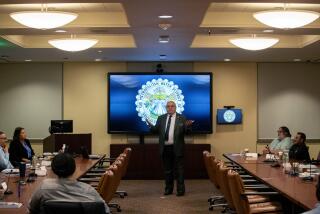California utilities commission fires its executive director
Following a meeting filled with charges and countercharges, the California Public Utilities Commission fired its executive director, Alice Stebbins, on a 5-0 vote Monday. The dismissal goes into effect Friday.
Commission President Marybel Batjer announced the decision after a virtual meeting in which Batjer outlined complaints about Stebbins’ hiring practices, followed by a 45-minute response from Stebbins and her attorneys.
Batjer did not elaborate on the decision that came after commissioners went into a three-hour closed session, but in her opening remarks, Batjer accused Stebbins of making false statements during an investigation surrounding the hiring of one employee and called her conduct “appalling and disgraceful.”
But Stebbins said she was let go because she and some members of her staff were looking into $200 million in uncollected fees and fines from companies the commission regulates and accused Batjer of impeding Stebbins’ attempts to rectify a “lack of fiscal responsibility and integrity” at the commission.
Stebbins, her attorneys and supporters who called in during the meeting’s public comment period also pointed to a cache of text messages from Batjer and other commissioners discussing the Stebbins case as violations of the state’s Bagley-Keene Open Meeting Act.
“I have been told by the commissioners, and it is clear from the text messages between themselves, the outcome of this hearing,” Stebbins said. “President Batjer, Commissioner [Clifford] Rechtschaffen and Commissioner [Liane] Randolph have told me they made up their minds to fire me before there was even a notice of hearing or meeting.”
Batjer, in her 15-minute presentation before Stebbins spoke, denied there was any vendetta against Stebbins and said the $200-million figure is incorrect. Batjer said there is $49.9 million in outstanding funds, but that large portions have not been collected so far because utilities have appealed them, so the money cannot be pocketed until each case is resolved.
“It’s near certain that we will be forced to ask the utilities to cut off power to millions today to balance supply and demand — today, tomorrow and perhaps beyond.”
Batjer’s remarks did not address the text messages, but a commission spokeswoman recently told the San Diego Union-Tribune that there was no violation of the open meeting law and that personnel matters “were discussed by the commissioners in legal, properly noticed closed sessions.”
Karl Olson, one of Stebbin’s attorneys, said Bagley-Keene forbids “serial meetings like this to arrive at a collective consensus and that’s exactly what you all have done. ... The commission has scoffed at that law and scoffed at Article I, Section 3 of the California Constitution, which was adopted by an 83% vote of the people and requires open meetings.”
The heart of the case against Stebbins concerned some hirings she made in her two years as executive director — essentially, the chief of staff — of the commission that oversees privately owned electric, natural gas, telecommunications, water and transportation companies.
A State Personnel Board investigation concluded Stebbins appeared to favor hiring colleagues who used to work with her at the California Air Resources Board and the State Water Resources Control Board.
The report said, in one instance, a manager who previously worked with Stebbins was hired even though the candidate had “inferior qualifications in comparison to some of the other applicants” and that “the scores of more qualified candidates were lowered to mirror” the rankings Stebbins wanted.
“You also failed to take any responsibility for your conduct,” Batjer said. “You expressed no concern for the affected candidates who participated in the hiring processes at issue or for the morale of current CPUC employees. Instead, you repeatedly suggested that the commissioners should use our political influence to — in your words — make the SPB report go away.”
Stebbins called the report “flawed and inaccurate” and said she alerted Batjer of the uncollected money at the start of this year, but said the commission president was “dismissive.” Stebbins accused Batjer, who was appointed in August 2019 by Gov. Gavin Newsom, of excluding her from meetings.
One of Stebbins’ attorneys, Therese Cannata, said five of the people highlighted in the State Personnel Board report that were hired by Stebbins were each “objectively qualified by any standard” and were hired as part of an effort by Stebbins to make the commission more accountable.”
Olson pointed to the commission in May waiving a $200-million fine against Pacific Gas & Electric after it was determined the utility neglected its equipment that ignited a string of deadly wildfires in 2017 and 2018. The commissioners waived the penalty after PG&E argued it would threaten the ability of the power company to raise billions of dollars in financing to get PG&E through bankruptcy proceedings.
“You gave PG&E a second chance ... after it committed felonies that killed people,” Olson said. “But you apparently don’t want to give Alice Stebbins a second chance after the SPB questions some of her hires.”
Batjer said Stebbins’ future as an at-will employee was based on the findings of the personnel board report.
“You took a series of actions over the course of several years that calls into question your integrity,” Batjer said. “Those actions, along with your conduct in reaction to and in response to the report’s findings” — Stebbins’ claims of $200 million in uncollected fees and commissioners ignoring or interfering with her work — “cause us to have to consider whether you can continue to serve as the leader of this agency.”
Olson said his legal team intends to “file a claim this week as a first step to litigation for the CPUC’s violation of the Bagley-Keene Act and for whistleblower retaliation.”
The questions surrounding the commissioners’ text messages also prompted a lawsuit by San Diego lawyers Michael Aguirre and Maria Severson.
Filed Monday morning in state appeals court, the suit seeks to stop the CPUC from holding closed sessions without notice and to “render void any action taken by means of such unlawful serial meetings.”
More to Read
Inside the business of entertainment
The Wide Shot brings you news, analysis and insights on everything from streaming wars to production — and what it all means for the future.
You may occasionally receive promotional content from the Los Angeles Times.












